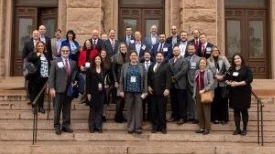The End is Near
By Kenneth Besserman
Director of Government Affairs and Special Counsel
Last Week in the Legislature | Issue 16
AUSTIN - Sine die is around the corner. The 89th Session of the Texas Legislature will sine die on June 2, 2025, ending a tumultuous session which some have labeled one of the most difficult sessions in decades. While many of the priorities of the Governor, Lt. Governor and Speaker have passed or will pass in the final days of session, there are many noncontroversial bills, agreed bills and good policy bills that will not see the light of day. None of this is very different from past sessions, but Capitol insiders, lobbyists, trade groups, and many others have been surprised by the disjointed and unpredictability of the 89th session. Political scorecard voting, bills not getting set for hearings and changes to the legislative process have made the end of the 89th session more appealing than ever.
Now for the good news. TXCPA has successfully passed both of its priority bills of the session. Governor Abbott signed both bills well before legislative deadlines and the end of the session. Texas is the very first large state to pass both pathways and mobility legislation. Texas has led the efforts nationally to make changes to CPA licensing and ensure individual practice mobility.
SB 522 – modernizing and individualizing CPA practice mobility – was signed by the Governor on May 19. The bill will ensure that only well qualified CPAs have practice privileges in Texas and will ensure that there is no disruption of practice mobility as states begin to change their licensing pathways. This will ensure that Texas taxpayers and businesses can continue to use out-of-state CPAs without any fear that out-of-state CPAs would lose their practice privileges in Texas. SB 522 has also become the model for the language that has been adopted by the Uniform Accountancy Act relating to mobility.
As you recall, SB 262 – creating an additional pathway to CPA licensure – was signed by the Governor on May 8, becoming one of the very first bills signed this legislative session. The pathways bill will become effective with the start of the 2026 academic year, giving higher education the time to adjust their baccalaureate programs to accommodate the required accounting and business coursework needed for CPA licensure. The hard work now begins with the adoption and implementation of board rules. TXCPA will work closely with the Texas State Board of Public Accountancy to develop rules that will properly implement the legislative intent of SB 262. Like SB 522, Texas is the first large state to pass pathways legislation.
The waning days of the 89th session see some very big issues still to pass. School funding – which includes teacher pay raises and financial support for school maintenance and operations – is currently being negotiated by the House and Senate conferees. It is likely that an agreement has been reached, but the details and bills language have not officially been released.
Additionally, the major water infrastructure funding bill and constitutional amendment are still being discussed. Water funding has become the central issue of the session and time is winding down for a compromise.
As a reminder, school choice passed earlier this session. SB 2 will create a program of at least $1 billion to provide vouchers – up to $10,000 – to be used for private school tuition. The program has been a priority of state leadership for a number of years and this session, the Legislature was able to pass it.
The last major issue that seems to have hit a roadblock is the banning, prohibiting or regulation of THC and cannabis-related products. The Senate has taken the approach of banning specific products while the House has focused on a more directly regulated approach. At the time of this article, it appears that the Senate approach to prohibiting and banning products will likely prevail. This bill is one of the last large bills that has yet to pass, so both sides of the rotunda are holding on to their positions as a negotiating tactic for other legislation.
In the final week of session, there will be a lot more movement on school finance, THC regulation, water funding, business development, homestead exemption increases, business inventory deductions, and many other bills. Stay tuned for a final recap of the 89th session in the coming days.
We are almost done for 2025. As most of the priority bills have passed or are likely to pass, the prospects of a special session in 2025 or 2026 seem highly unlikely. With all statewide elected officials on the ballot in 2026, the appetite for a special session will be a lot smaller. Let’s keep our fingers crossed for that.
Only 9 days left in the session!!


